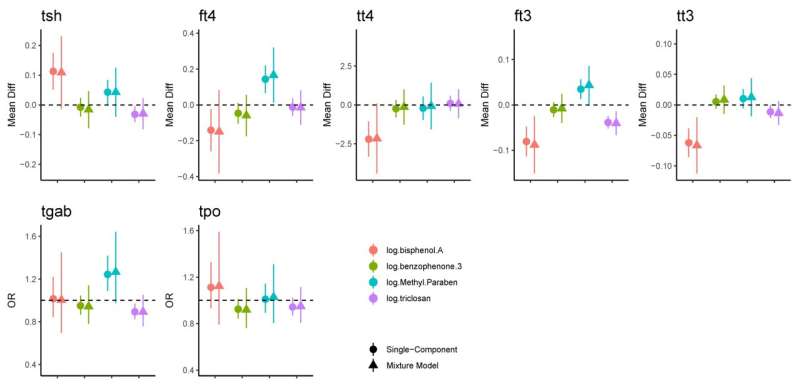This article has been reviewed according to Science X's editorial process and policies. Editors have highlighted the following attributes while ensuring the content's credibility:
fact-checked
trusted source
proofread
Exposure to environmental chemicals linked to thyroid complications

A study led by investigators from Brigham and Women's Hospital, a founding member of the Mass General Brigham health care system, reveals multiple associations between the presence of phenol biomarkers and altered thyroid hormone measurements among women seeking fertility care. Their results are published in the journal Toxics, and provide additional insights into how exposure to environmental chemicals and lifestyle choices may affect reproductive health.
"Many women nowadays experience thyroid problems. Therefore, we aimed to identify some predictors of thyroid hormone levels in order to help women improve their health," said senior author Lidia Mínguez-Alarcón, Ph.D., MPH, an assistant professor at Harvard Medical School, reproductive epidemiologist in the Brigham's Channing Division of Network Medicine and co-investigator of the Environment and Reproductive Health (EARTH) study. "In this context, a woman's health is more than just her well-being, but also her fertility and her knowledge of dangers."
Repeated exposure to specific phenol chemicals found in everyday items like toys, sunscreen, dental products, food packaging, and food preservatives can disrupt hormonal balances within the body, leading to adverse health effects. Previous studies have evaluated these individual chemicals and their effects on the thyroid. However, the combined impact of these multiple phenols on the endocrine system, particularly in relation to female fertility, is not yet fully understood.
Fertility relies crucially on maintaining a steady harmony of hormones within the body. Disruptions to these levels can occur from external sources, particularly exposure to environmental hazards. Brigham researchers sought to assess the impact of some of the most common environmental chemicals that have been shown in animal models to affect thyroid hormones.
Their study looked at 339 women seeking care at a fertility clinic. The team evaluated urinary concentrations for phenol biomarkers and serum samples for molecular markers of thyroid function and thyroid autoimmunity. Various statistical methods were then used to gauge the combined influence of these biomarkers on thyroid levels.
By evaluating the simultaneous combinations of chemicals, the researchers were able to more accurately capture real world effects as humans are exposed to hundreds of chemicals at the same time, not just one by one. The researchers observed that the presence of urinary bisphenol A, methylparaben and triclosan were also associated with altered thyroid hormonal levels, and some of them were suggestive of thyroid diseases, including hypothyroidism. All of these phenols can be found in consumer products, regulated by the United States Food and Drug Administration.
The researchers acknowledged that some of their measured associations diverged from findings in previous publications. This could be due to different study populations, phenol biomarker concentrations, or other phenols that were not measured in this study. Future studies should repeat these tests and consider the long-term consequences of altered thyroid function.
"This study is particularly unique in its focus on women whose fertility is sub-optimal, who have been shown to be at higher risk for thyroid disease," said Mínguez-Alarcón. "In previous research with the same study cohort (EARTH), we found that women with altered thyroid hormones had lower ovarian reserve, measured as diminished antral follicle count. Thus, while more longitudinal studies will be needed to corroborate these results, preventing significant fluctuations in thyroid hormonal levels could be crucial for maintaining a women's fertility potential."
More information: Glen McGee et al, Associations of Maternal Urinary Concentrations of Phenols, Individually and as a Mixture, with Serum Biomarkers of Thyroid Function and Autoimmunity: Results from the EARTH Study, Toxics (2023). DOI: 10.3390/toxics11060521



















